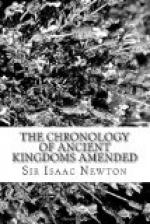added,
Hypaenus being victor. And in the
18th Olympiad the
Quinquertium and Wrestling
were added,
Lampus and
Eurybatus, two
Spartans, being victors: And the Disc was
one of the games of the
Quinquertium. [32]
Pausanias tells us that there were three Discs
kept in the Olympic treasury at
Altis:
these therefore having the name of
Lycurgus
upon them, shew that they were given by him, at the
institution of the
Quinquertium, in the 18th
Olympiad. Now
Polydectes King of
Sparta,
being slain before the birth of his son
Charillus
or
Charilaus, left the Kingdom to
Lycurgus
his brother; and
Lycurgus, upon the birth of
Charillus, became tutor to the child; and after
about eight months travelled into
Crete and
Asia, till the child grew up, and brought back
with him the poems of
Homer; and soon after
published his laws, suppose upon the 22d or 23d Olympiad;
for he was then growing old: and
Terpander
was a Lyric Poet, and began to flourish about this
time; for [33] he imitated
Orpheus and
Homer,
and sung
Homer’s verses and his own,
and wrote the laws of
Lycurgus in verse, and
was victor in the
Pythic games in the 26th
Olympiad, as above. He was the first who distinguished
the modes of Lyric music by several names.
Ardalus
and
Clonas soon after did the like for wind
music: and from henceforward, by the encouragement
of the
Pythic games, now instituted, several
eminent Musicians and Poets flourished in
Greece:
as
Archilochus,
Eumelus Corinthius,
Polymnestus,
Thaletas,
Xenodemus,
Xenocritus,
Sacadas,
Tyrtaeus,
Tlesilla,
Rhianus,
Alcman,
Arion,
Stesichorus,
Mimnermnus,
Alcaeus,
Sappho,
Theognis,
Anacreon,
Ibycus,
Simonides,
AEschylus,
Pindar,
by whom the Music and Poetry of the
Greeks
were brought to perfection.
Lycurgus, published his laws in the Reign of
Agesilaus, the son and successor of Doryagus,
in the Race of the Kings of Sparta descended
from Eurysthenes. From the Return of the
Heraclides into Peloponnesus, to the
end of the Reign of Agesilaus, there were six
Reigns: and from the same Return to the end of
the Reign of Polydectes, in the Race of the
Spartan Kings descended from Procles,
there were also six Reigns: and these Reigns,
at twenty years a-piece one with another, amount unto
120 years; besides the short Reign of Aristodemus,
the father of Eurysthenes and Procles,
which might amount to a year or two: for Aristodemus
came to the crown, as [34] Herodotus and the
Lacedaemonians themselves affirmed. The
times of the deaths of Agesilaus and Polydectes




